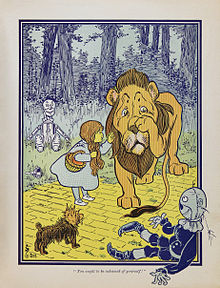
Cowardice is a trait wherein excessive fear prevents an individual from taking a risk or facing danger. It is the opposite of courage. As a label, "cowardice" indicates a failure of character in the face of a challenge. One who succumbs to cowardice is known as a coward.
As the opposite of bravery, which many historical and current human societies reward, cowardice is seen as a character flaw that is detrimental to society and thus the failure to face one's fear is often stigmatized or punished.
Etymology
According to the Online Etymology Dictionary, the word coward came into English from the Old French word coart (modern French couard), which is a combination of the word for "tail" (Modern French queue, Latin cauda) and an agent noun suffix. It would therefore have meant "one with a tail", which may conjure an image of an animal displaying its tail in flight of fear ("turning tail"), or a dog's habit of putting its tail between its legs when it is afraid. Like many other English words of French origin, this word was introduced in the English language by the French-speaking Normans, after the Norman conquest of England in 1066.
The English surname Coward (as in Noël Coward), however, has the same origin and meaning as the word "cowherd".
In German, the word translates into "Feigling" and "Weichei", the latter of which translates back to "soft egg" in literal.
Military law
Acts of cowardice have long been punishable by military law, which defines a wide range of cowardly offenses, including desertion in face of the enemy and surrendering to the enemy against orders. The punishment for such acts is typically severe, ranging from corporal punishment to the death sentence.
The United States military codes of justice define cowardice in combat as a crime punishable by death.
Generally, cowardice was punishable by execution during World War I, and those who were caught were often court-martialed and, in many cases, executed by firing squad. British soldiers executed for cowardice were often not commemorated on war memorials, and their families often did not receive benefits and had to endure social stigma. However, many decades later, those soldiers all received posthumous pardons in the UK Armed Forces Act 2006 and have been commemorated with the Shot at Dawn Memorial. Unlike British, Canadian, French, German, and Russian forces, the U.S. military tried soldiers for cowardice, but never followed through with execution while German commanders were less inclined to use execution as a form of punishment.
Considerable controversy was generated by military historian S.L.A. Marshall, who claimed that 75% of U.S. combat troops in World War II never fired at the enemy for the purpose of killing, even while under direct threat. Author Dave Grossman attempted to explain these findings in his book On Killing: The Psychological Cost of Learning to Kill in War and Society. Marshall's findings were later challenged as mistaken or even fabricated, and were not replicated in a more rigorous study of Canadian troops in World War II.
See also
References
- "Cowardly definition and meaning | Collins English Dictionary". www.collinsdictionary.com. Retrieved 5 July 2019.
- "Coward". Merriam Webster. 19 March 2024.
- "cowardice". Dictionary.reference.com. reference.com. Lexico Publishing Group, LLC. Archived from the original on 28 April 2007. Retrieved 24 February 2019.
lack of courage to face danger, difficulty, opposition, pain, etc.
- "Why it's brave and prudent to think like a coward | Aeon Essays".
- Garreau, Joseph E. "From French to English:Surprising Etymology". Department of Languages of the UMASS Lowell. Retrieved 16 December 2015.
- "Any person found guilty of desertion or attempt to desert shall be punished, if the offense is committed in time of war, by death or such other punishment as a court-martial may direct, but if the desertion or attempt to desert occurs at any other time, by such punishment, other than death, as a court-martial may direct."
- 10 U.S. Code § 885 - Art. 85.-"Desertion"
- "10 U.S. Code § 899 - Art. 99. Misbehavior before the enemy". LII / Legal Information Institute. Retrieved 19 August 2020.
- Norton-Taylor, Richard (16 August 2006). "Executed WW1 soldiers to be given pardons". The Guardian. Guardian News & Media Limited. Retrieved 24 February 2019.
- "Call to rethink cases of French WWI 'coward' soldiers". BBC News. BBC. 1 October 2013. Retrieved 24 February 2019.
- Woodward, David R. (2009). World War I Almanac. Infobase Publishing. p. 28. ISBN 9781438118963.
- Engen, Robert. "Killing for Their Country: A New Look At "Killology"". Canadian Military Journal. 9 (2). Archived from the original on 21 July 2011. Retrieved 8 May 2011.
As a military historian, I am instinctively skeptical of any work or theory that claims to overturn all existing scholarship – indeed, overturn an entire academic discipline – in one fell swoop... Lieutenant Colonel Grossman's appeals to biology and psychology are flawed, and that the bulwark of his historical evidence – S.L.A. Marshall's assertion that soldiers do not fire their weapons – can be verifiably disproven.
- Spiller, Roger J. (Winter 1988). "S.L.A. Marshall and the Ratio of Fire". RUSI Journal. pp. 63–71. Archived from the original on 10 December 2005 – via War Chronicle.
- Smoler, Fredric (March 1989). "The Secret Of The Soldiers Who Didn't Shoot". American Heritage. Vol. 40, no. 2. Retrieved 24 February 2019.
- Engen, Robert Charles (March 2008). Canadians Against Fire: Canada's Soldiers and Marshall's "Ratio of Fire" 1944-1945 (PDF) (Thesis). Kingston, Ontario: Queen's University. p. 142. hdl:1974/1081. Retrieved 24 February 2019.